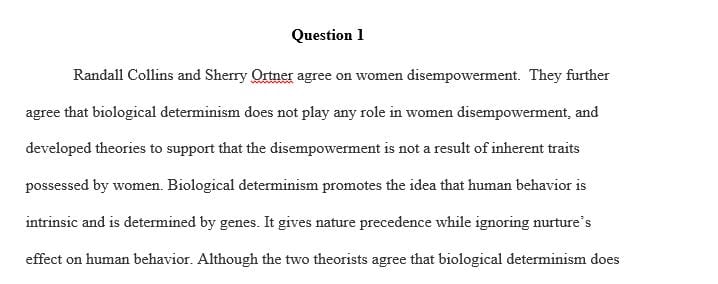Why women have been universally disempowered relative to men across societies
Answer in one or two paragraphs for each question:
1. Both Randall Collins and Sherry Ortner present theories that try to account for why women have been universally disempowered relative to men across societies. Both of them reject simple biological determinism, but otherwise their accounts are quite different. Describe both theories and note their major points of divergence.
2. The theoretical paradigm that West and Zimmerman advanced in “Doing Gender” has been highly influential in the sociology of gender. How do they define sex and sex category, and what do they mean by saying that gender is a “routine accomplishment” in everyday interaction? How can this framework be applied to Quinn’s findings in “Sexual Harassment and Girl Watching”?
3. Cecilia Ridgeway, in “Intersecting Cultural Beliefs in Social Relations”, argues that cultural schemas about race, class, and gender combine in ways that create particular “binds” and “freedoms” for various subgroups like Asian men, Black women, Black men, and poor whites. Explain how she says this happens in American culture, and what situations are created for some of these subgroups.
4. Describe Joan Acker’s theory of “gendered organizations”. How do Ely and Meyerson build upon, elaborate, or critique this theory?
Be on time. No plagiarism and make the work top notch, please.
Answer preview to why women have been universally disempowered relative to men across societies
APA
1422 words


